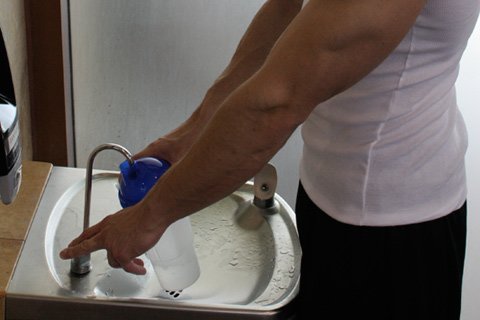Almost a decade ago we on earth were sent something from the heavens by the name of creatine. Creatine was the product that really shattered the old image of health supplements as being only grossly tasting protein powders. No legal product had ever yielded the caliber of gains that creatine offered, and in such a seemingly safe manner.
This is the reason I am still surprised to see people preaching the possible dangers of creatine. I have personally taken creatine off and on since its introduction in the 1990's. I have never had a serious problem with the substance, and have had nothing but success using the product.
This is what prompted me to take a look at what some of the dissenters had to say about creatine use. Out of all of the articles and reports that I have read, creatine has been blamed for everything from depression to toxicity and even low sperm count.
The fact is that there is always a needle in the haystack, and that just because a handful of people have accused creatine for their health problems this should be expected.
Is Creatine Dangerous?
Being an aspiring scientist myself there are a few things you should take into serious consideration when reading these articles for yourself. First of all, most of the evidence I encountered was not performed in laboratory tests, and are simply complaints by individuals.
Nobody knows whether or not the individual ingested the recommended doses, first of all. Secondly, psychosomatics plays a large role in the human response to any pharmaceutical or health supplement.
You may have even experienced this yourself, I know that I have. While any substance you put in your body can be potentially dangerous in the wrong quantity, there is almost always a therapeutic dose available.
The truth is that there are certainly people who shouldn't take creatine. Identifying these people is the problem that is at hand and responsible for a lot of the negative feedback about this wonderful supplement.
After reading more than a few reports, I decided to ask one of my organic chemistry professors about his take on the substance. I told him what I was doing this for, and he agreed so long as I leave he and the university anonymous, for political purposes basically. This particular professor has tenure at my university, and is the acting physician for all of our sports teams.
The first thing that I asked him about was the danger of using the substance. He confirmed that there are, in fact some dangers associated with the use of the supplement, but that it is very limited to a few individuals.
He also agreed that he thought a lot of the negativity was due to people taking well over the recommended dose, and that he has personally never encountered an athlete who experienced any long term problems from using creatine in the recommended amounts.
Common Issues With Creatine
The most common problem being upset stomach, that usually faded after the loading phase, and never returned. I associated it to being similar to the first time I had ever eaten red meat after eliminating it from my diet for over two years. I was as sick as a dog, and anyone who has encountered the same thing knows what I am talking about.
He then addressed the people who blamed creatine for some of the more serious health problems and gave the analogy that some people shouldn't take creatine, just as someone with a heart murmur shouldn't take something like ephedrine, and that since the symptoms aren't as obvious they are overlooked usually for some time. These people he assured were in the minority.
I then asked him specifically about the claims that creatine may cause depression. For me that was the most startling of all of the accusations I read. He explained to me that a lot of times people don't drink enough water while supplementing with creatine, and that dehydration will often magnify a mood disorder like manic depression or other related disorders, which may or may not have been diagnosed yet.

 Click Image To Enlarge.
Click Image To Enlarge. A Lot Of Times People Don't Drink Enough
Water While Supplementing With Creatine.
Danger Of Dehydration
In the manner which creatine works it may lead to body dehydration by stealing water from the other parts of the body. Furthermore, if that person is already on some form of anti-depressant, the lack of hydration will interfere with the mechanism by which it works, thus retracting its effect on the disorder or creating a level of toxicity for that substance in the body.
He said that most of the time a physician will tell the patient to drink plenty of water, especially if lithium is prescribed, and that people generally don't think enough about what the creatine is actually doing resulting in body dehydration.
His final word on the subject was that creatine is safe when used responsibly, and that one should take time off of the supplement for not only health reasons but also to "shock" your body when you do begin to load again.
He also said that for those who do experience problems more severe than upset stomach etc. that they should consult their doctor to see if the problem with creatine may not be a problem with creatine at all, but with something else that the creatine just so happens to bring out.
Conclusion
So after all of this, the only thing I have to say is keep loading, and keep cycling until some definitive research, rather than circumstance or coincidence warrants a change in how we take creatine.
